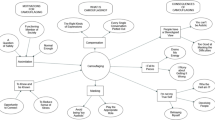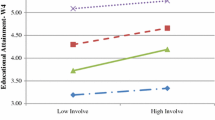Abstract
Many interventions for children’s behavior problems successfully utilize a group format for social skills training, providing opportunities for practice and performance feedback from peers. Recent studies however, suggest that grouping aggressive children together may reduce intervention effectiveness or even increase risk. The present study examined the relative impact of children’s own behavior and their experiences with peers in the first-grade “friendship groups” of Fast Track, a multi-component preventive intervention program. Two-hundred sixty-six children (56% minority, 29% female) participated in 55 friendship groups. Children’s own positive and negative behavior in friendship groups was related to relative improvements in social cognitive skills, prosocial behavior, and aggression, assessed through child interviews, teacher ratings, and peer sociometric nominations. Results from hierarchical linear models also revealed that the amount of peer escalation children received for their disruptive behavior during sessions impeded some intervention gains, whereas mere exposure to other children’s positive or negative behavior was rarely related to outcomes.
Similar content being viewed by others
References
Asarnow, J. R. (1983). Children with peer adjustment problems: Sequential and nonsequential analyses of school behaviors. Journal of Consulting and Clinical Psychology, 51, 709–717.
Bagwell, C. L., Coie, J. D., Terry, R. A., & Lochman, J. E. (2000). Peer clique participation and social status in preadolescence. Merrill-Palmer Quarterly, 45, 280–305.
Bierman, K. L. (1986). Process of change during social skills training with preadolescents and its relation to treatment outcome. Child Development, 57, 230–240.
Bierman, K. L. (2004). Peer rejection: Developmental processes and intervention strategies. New York: Guilford Press.
Bierman, K. L., Greenberg, M. T., & CPPRG (1996). Social skills training in the Fast Track program. In R. D. Peters & R. J. McMahon (Eds.), Preventing childhood disorders, substance abuse, and delinquency. Banff international behavioral science series, Vol. 3 (pp. 65–89). Thousand Oaks, CA: Sage.
Bierman, K. L., Miller, C. L., & Stabb, S. D. (1987). Improving the social behavior and peer acceptance of rejected boys: Effects of social skill training with instructions and prohibitions. Journal of Consulting and Clinical Psychology, 55, 194–200.
Boivin, M., Dodge, K. A., & Coie, J. D. (1995). Individual-group behavioral similarity and peer status in experimental play groups of boys: The social misfit revisited. Journal of Personality and Social Psychology, 69, 269–279.
Cillessen, A. H. N., van IJzendoorn, H. W., van Lieshout, C. F. M., & Hartup, W. W. (1992). Heterogeneity of peer rejected boys. Child Development, 63, 893–905.
Coie, J. D. (1990). Toward a theory of peer rejection. In S. R. Asher & J. D. Coie (Eds.), Peer rejection in childhood (pp. 365–401). Cambridge: Cambridge University Press.
Conduct Problems Prevention Research Group (1992). A developmental and clinical model for the prevention of conduct disorder: The FAST Track program. Development and Psychopathology, 4, 509–527.
Conduct Problems Prevention Research Group. (1998). The FAST-Track Social Competence Scale, Technical Report. Available: http://www.fasttrackproject.org.
Conduct Problems Prevention Research Group (1999). Initial impact of the Fast Track prevention trial for conduct problems: I. The high-risk sample. Journal of Consulting and Clinical Psychology, 67, 631–647.
Conduct Problems Prevention Research Group (2002). Evaluation of the first 3 years of the Fast Track prevention trial with children at high risk for adolescent conduct problems. Journal of Abnormal Child Psychology, 30, 19–35.
Dishion, T. J., McCord, J., & Poulin, F. (1999). When interventions harm: Peer groups and problem behavior. American Psychologist, 54, 755–764.
Dishion, T. J., Spracklen, K. M., Andrews, D. W., & Patterson, G. R. (1996). Deviancy training in male adolescent friendships. Behavior Therapy, 27, 373–390.
Dodge, K. A. (1980). Social cognition and children’s aggressive behavior. Child Development, 51, 162–170.
Dodge, K. A. (1986). A social information processing model of social competence in children. In M. Perlmutter (Ed.), Minnesota symposium in child psychology (pp. 77–125). Hillsdale, NJ: Lawrence Erlbaum.
Dodge, K. A., Bates, J. E., & Pettit, G. S. (1990). Mechanisms in the cycle of violence. Science, 250, 1678–683.
Dodge, K. A., Pettit, G. S., Bates, J. E., & Valente, E. (1995). Social information-processing patterns partially mediate the effect of early physical abuse on later conduct problems. Journal of Abnormal Psychology, 104, 632–643.
Englund, M. M., Levy, A. K., Hyson, D. M., & Sroufe, L. A. (2000). Adolescent social competence: Effectiveness in a group setting. Child Development, 71, 1049–1060.
Farmer, A. D., Bierman, K. L., & the Conduct Problems Prevention Research Group. (2002). Predictors and consequences of aggressive-withdrawn problem profiles in early grade school. Journal of Clinical Child and Adolescent Psychology, 31, 299–311.
Hollingshead, A. A. (1979). Four-factor index of social status. Unpublished manuscript, Yale University, CT: New Haven.
Hudley, C., & Graham, S. (1993). An attributional intervention to reduce peer-directed aggression among African-American boys. Child Development, 64, 124–138.
Kellam, S. G., Ling, X., Merisca, R., Brown, C. H., & Ialongo, N. (1998). The effect of the level of aggression in the first grade classroom on the course and malleability of aggressive behavior into middle school. Development and Psychopathology, 10, 165–185.
Kusche, C. A., & Greenberg, M. T. (1994). The PATHS curriculum. Seattle: Developmental Research and Programs.
Ladd, G. W., & Mize, J. (1983). A cognitive-social learning model of social-skill training. Psychological Review, 90, 127–157.
Lochman, J. E., Burch, P. R., Curry, J. F., & Lampron, L. B. (1984). Treatment and generalization effects of cognitive-behavioral and goal-setting interventions with aggressive boys. Journal of Consulting and Clinical Psychology, 52, 915–916.
Lochman, J. E., & Lenhart, L. A. (1993). Anger coping intervention for aggressive children: Conceptual models and outcome effects. Clinical Psychology Review, 13, 785–805.
McMahon, R. J., Slough, N., & the Conduct Problems Prevention Research Group. (1996). Family-based intervention in the Fast Track Program. In R. DeV. Peters & R. J. McMahon (Eds.), Preventing childhood disorders, substance abuse, and delinquency (pp. 90–110). Thousand Oaks, Sage: CA.
Miller-Johnson, S., Coie, J. D., Maumary-Gremaud, A., Bierman, K., & the Conduct Problem Prevention Research Group (2002). Peer rejection and aggression and early starter models of conduct disorder. Journal of Abnormal Child Psychology, 30, 217–230.
Patterson, G. R., Dishion, T. J., & Yoerger, K. (2000). Adolescent growth in new forms of problem behavior: Macro- and micro-peer dynamics. Prevention Science, 1, 3–13.
Patterson, G. R., Littman, R. A., & Bricker, D. (1967). Assertive behavior in children: A step toward a theory of aggression. Monographs of the Society for Research in Child Development, 32 (5, Serial No. 18b).
Pepler, D., King, G., Craig, W. M., Byrd, B., & Bream, L. (1995). The development and evaluation of a multisystem social skills group training program for aggressive children. Child and Youth Care Forum, 24, 297–313.
Poulin, F., Dishion, T. J., & Burraston, B. (2001). 3-Year iatrogenic effects associated with aggregating high-risk adolescents in cognitive-behavioral preventive intervention. Applied Developmental Science, 5, 214–224.
Prinz, R. J., Blechman, E. A., & Dumas, J. E. (1994). An evaluation of peer coping-skills training for childhood aggression. Journal of Clinical Child Psychology, 23, 193–203.
Raudenbush, S. W., & Bryk, A. S. (2002). Hierarchical linear models. Thousand Oaks, CA: Sage.
Ribordy, S. C., Camras, L. A., Stafani, R., & Spaccarelli, S. (1988). Vignettes for emotion recognition research and affective therapy with children. Journal of Clinical Child Psychology, 17, 322–325.
Rubin, K. H., & Krasnor, L. R. (1986). Social-cognitive and social behavioral perspectives on problem solving. Minnesota Symposium on Child Psychology, 18, 1–68.
Stormshak, E. A., Bierman, K. L., Bruschi, C., Dodge, K. A., Coie, J. D., & Conduct Problems Prevention Research Group (1999). The relation between behavior problems and peer preference in different classroom contexts. Child Development, 70(1), 169–182.
Thornberry, T. P., Lizotte, A. J., Krohn, M. D., Farnworth, M. & Jang, J. J. (1994). Delinquency of peers, beliefs, and delinquent behavior: A longitudinal test of interactional theory. Criminology, 32, 47–83.
Tremblay, R. E., Pagani-Kurtz L., Mâsse, L. C., Vitaro, F., & Pihl, R. O. (1995). A bimodal preventive intervention for disruptive kindergarten boys: Its impact through mid-adolescence. Journal of Consulting and Clinical Psychology, 63, 560–568.
Vitaro, F., Brendgen, M., Pagani, L., Tremblay, R. E., & McDuff, P. (1999). Disruptive behavior, peer association, and conduct disorder: Testing the developmental links through early intervention. Development and Psychopathology, 11, 287–304.
Vitaro, F., Tremblay, R. E., & Gagnon, C. (1992). Peer rejection from kindergarten to Grade 2: Outcomes, correlates, and prediction. Merrill-Palmer Quarterly, 38, 382–400.
Walker, H. M., Stiller, B., Severson, H. H., Feil, E. G., & Golly, A. (1998). First Step to Success: Intervening at the point of school entry to prevent antisocial behavior patterns. Psychology in the Schools, 35, 259–269.
Werthamer-Larsson, L., Kellam, S., & Wheeler, L. (1991). Effect of first-grade classroom environment on shy behavior, aggressive behavior, and concentration problems. American Journal of Community Psychology, 19, 585–602.
Wright, J. C., Giammarino, M., & Parad, H. W. (1986). Social status in small groups: Individual-group similarity and the social “misfit.” Journal of Personality and Social Psychology, 50, 523–536.
Zarbatany, L., & Pepper, S. (1996). The role of the group in peer group entry. Social Development, 5, 251–260.
Zarbatany, L., Van Brunschot, M., Meadows, K., & Pepper, S. (1996). Effects of friendship and gender on peer group entry. Child Development, 67, 2287–2300.
Author information
Authors and Affiliations
Consortia
Corresponding author
Additional information
Members of the Conduct Problems Prevention Research Group are, in alphabetical order, Karen L. Bierman, Pennsylvania State University; John D. Coie, Duke University; Kenneth A. Dodge, Duke University; E. Michael Foster, Pennsylvania State University; Mark T. Greenberg, Pennsylvania State University; John E. Lochman, University of Alabama; Robert J. McMahon, University of Washington; and Ellen E. Pinderhughes, Tufts University
Rights and permissions
About this article
Cite this article
Lavallee, K.L., Bierman, K.L., Nix, R.L. et al. The Impact of First-Grade “Friendship Group” Experiences on Child Social Outcomes in the Fast Track Program. J Abnorm Child Psychol 33, 307–324 (2005). https://doi.org/10.1007/s10802-005-3567-3
Received:
Revised:
Accepted:
Issue Date:
DOI: https://doi.org/10.1007/s10802-005-3567-3




